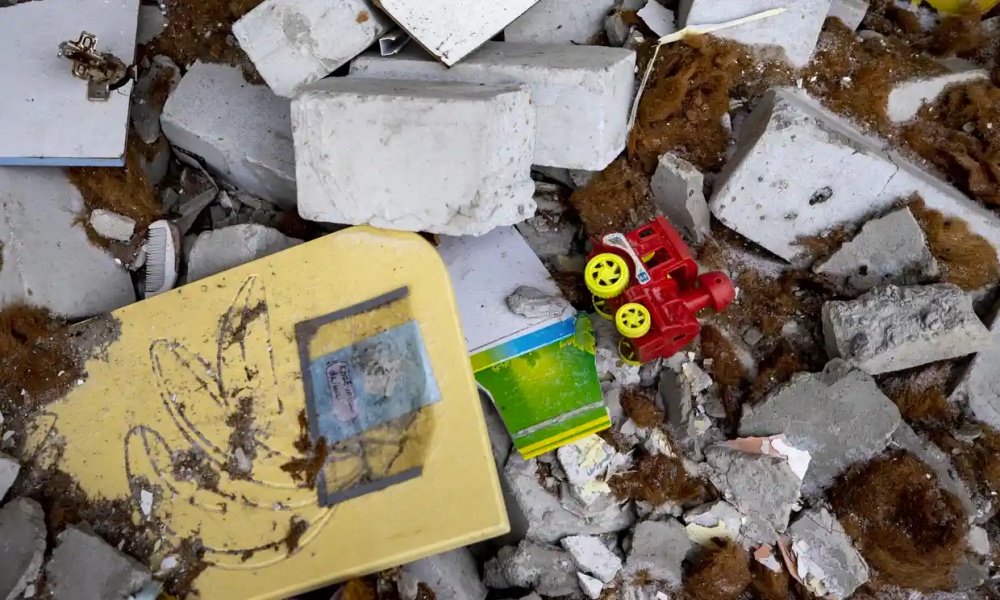In at least two of the camps, the children’s return date was delayed by weeks, while at two other camps, the return of some children was postponed indefinitely.
Russian authorities sought to provide a pro-Moscow viewpoint to children through school curricula as well as through field trips to patriotic sites and talks from veterans, the report found.
Videos published from the camps by the occupying regional authorities show children in the camps singing the Russian national anthem and carrying the Russian flag. In separate videos, teachers, employed to teach the children, talk about the need to correct their understanding of Russian and Soviet history.
Children were also given training in firearms, although Nathaniel Raymond, a Yale researcher who oversaw the report, said there was no evidence they were being sent back to fight.
“Mounting evidence of Russia’s actions lays bare the Kremlin’s aims to deny and suppress Ukraine’s identity, history, and culture,” the US state department said in a statement. “The devastating impacts of Putin’s war on Ukraine’s children will be felt for generations.”
US state department spokesperson Ned Price told reporters the report “details Russia’s systematic, government-wide efforts to permanently relocate thousands of Ukraine’s children to areas under Russian government control via a network of 43 camps and other facilities.
“In many cases, Russia purported to temporarily evacuate children from Ukraine under the guise of a free summer camp, only to later refuse to return the children and to cut off all contact with their families.”
The report called for a neutral body to be granted access to the camps and for Russia immediately to stop adoptions of Ukrainian children. The report said that Putin aides have been closely involved in the operation, especially Maria Lvova-Belova, the presidential commissioner for children’s rights. It quoted her as saying that 350 children had been adopted by Russian families and that more than 1,000 were awaiting adoption.
Russia’s embassy in Washington responded to the report’s findings on Telegram, saying, “Russia accepted children who were forced to flee with their families from the shelling,” and, “We do our best to keep underage people in families, and in cases of absence or death of parents and relatives – to transfer orphans under guardianship.”
The report said some parents were pressured to give consent to send away their children, sometimes in the hope they would return. Others, the report said, “are sent with the consent of their parents for an agreed duration of days or weeks and returned to their parents as originally scheduled”.
The report -which was compiled with the help of satellite imagery and public accounts – said that the number of children sent to the camps is “likely significantly higher” than the 6,000 confirmed.
Researchers spoke to the parents of children who had attended the camps or were being kept there, as well as to children who had attended. “After calling the camp director, one mother was allegedly told that children could not be returned because, ‘There is war there.’
There is little information on the explanation given to children regarding delays in their return. An official at the Medvezhonok camp told a boy from Ukraine that his return was conditional: the children would be returned only if Russia recaptured the town of Izium, the report said. Another boy was told he wouldn’t be returning home due to his “pro-Ukrainian views”, the report said.
Some parents were told that their children will be released only if they physically come to pick them up. Relatives or people given power of attorney were not allowed to pick up the children. Travel from Ukraine to Russia is difficult and expensive, and men between the ages of 18 and 60 are forbidden from leaving the country, in effect meaning only the mothers of the children may retrieve them.
“A significant portion of these families are low-income and have not been able to afford to make the trip. Some families were forced to sell belongings and travel through four countries to be reunited with their child,” the report found.
One of the camps is located in Magadan oblast, roughly 6,230km (3,900 miles) from Ukraine. This puts it “roughly three times closer to the United States than it is to the border of Ukraine,” the report said.
Raymond said that Russia was in “clear violation” of the Fourth Geneva Convention on the treatment of civilians during war and called the report a “gigantic Amber alert” – referring to US public notices of child abductions.
The Russian activity “in some cases may constitute a war crime and a crime against humanity”, he told reporters.
Ukraine’s government recently claimed that more than 14,700 children had been deported to Russia, where some had been sexually exploited.
Additional reporting by Isobel Koshiw and AFP

